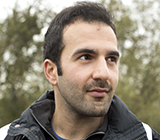 We look on in silence from the car window as scenes of normality in central Calais, a typical Western European city, give way to the squalor and misery of the infamous refugee camp on the city outskirts known as “The Jungle.” There is no warning, no transition; the contrast is stark. Entering the camp, the convoy meanders its way between hastily erected tents and shacks, and advances along the dirt path. We pass by people crowding around one of the few water points in the camp, busy collecting water and washing. A few weather worn and tired faces look up at us from the crowd. We exchange a few heart felt smiles and waves, and the convoy is on its way again.
We look on in silence from the car window as scenes of normality in central Calais, a typical Western European city, give way to the squalor and misery of the infamous refugee camp on the city outskirts known as “The Jungle.” There is no warning, no transition; the contrast is stark. Entering the camp, the convoy meanders its way between hastily erected tents and shacks, and advances along the dirt path. We pass by people crowding around one of the few water points in the camp, busy collecting water and washing. A few weather worn and tired faces look up at us from the crowd. We exchange a few heart felt smiles and waves, and the convoy is on its way again.
We approach the Médecins du Monde (Doctors of the World) clinic in the heart of the camp to find an orderly queue already formed at its entrance. Once the medications and supplies have been carried into the clinic, no time is lost and patients are shown in, triaged in the first tent, and then led either to a doctor for medical consultations, the nurse for wound care, the physiotherapist, or the psychologist.
The majority of disease stems from the deplorable living conditions, inadequate sanitation, malnutrition, and overwhelming misery that pervades the camp. Scabies is rampant and, with the constant influx and efflux of migrants, extremely difficult to control. Conventional treatment methods are not possible as the migrants have limited access to hot water and washing facilities, and usually have no change of clothes. The clinic has resorted to providing a one-off dose of an anti-parasitic medication, a spray for clothes and bedding, a set of fresh clothes, and advice to brave the queues for the only set of showers serving the six thousand people living in the camp.
More worrying infectious diseases are also to be found in the camp. A boy presents with high fever, chills, rigors and confusion, and is immediately transferred to hospital for malaria testing and treatment. A man is carried into the clinic as he no longer has the strength to walk. The golf-ball sized lymph nodes in his neck are particularly prominent set against his wasted body, his eyes wide and fervent with delirium, his pulse racing, beads of sweat trickling down his feverish forehead. The hospital later confirms my fears: tuberculosis—a public health nightmare in such an overcrowded and uncontrollable environment.
Oral thrush and sexually transmitted diseases, such as gonorrhea, chancroid, and lymphogranuloma venereum, raise significant concerns about risky sexual behaviour and the prevalence and spread of HIV in the camp. Pregnancies are regularly picked up in the clinic and, after shedding anguished tears, most women opt for termination, terrified at the thought of giving birth in a refugee camp. Amongst the frequent attendees are a group of women known to be sex workers, another real and largely unaddressed problem in the camp.
Trauma is an extremely common presentation at the clinic, the majority sustained from desperate attempts to cross to England. Deep and ugly wounds from climbing barbed and razor wire fencing, calcaneal fractures from falling off high fences and lorries, forearms fractured during frantic escapes from police dogs. The horror these people face does not extinguish their hope, and they continue to attempt the dangerous journey each night. Most are unsuccessful—and can be seen returning despondently to the camp in the early morning.
In the camp’s filthy conditions many wounds become severely infected and require hospital admission for surgical debridement, intravenous antibiotics, and tetanus vaccinations. One man with a particularly festering wound refused to be taken to hospital despite my repeated warnings that he may otherwise lose his hand and become fatally septic. The reason for his refusal? Admission would prevent him from attempting to cross the Channel that night.
Trauma from police violence is an almost daily occurrence: pepper spray, batons, and rubber bullets are used during the night when only the voiceless migrants can bear witness to the brutality. A visibly shaken man from Syria shows me his grossly swollen and exquisitely painful arm and leg, struck by rubber bullets at close range the night before. As I help him to the car that will transfer him to hospital, he looks at me through blazing eyes wizened by all he had encountered on his journey. “If I had known I would be received in Europe in this way, I would never have come,” he tells me, fighting to hold back his tears. “I would have rather stayed in Syria and died in dignity than suffer this humiliation.” I watch with a heavy heart as he disappears into the car and is driven away. Another young soul broken by the shards of his shattered dreams.
To donate to The BMJ‘s Christmas appeal please click here.
Mohammed Bakir is a doctor with Doctors of the World.
